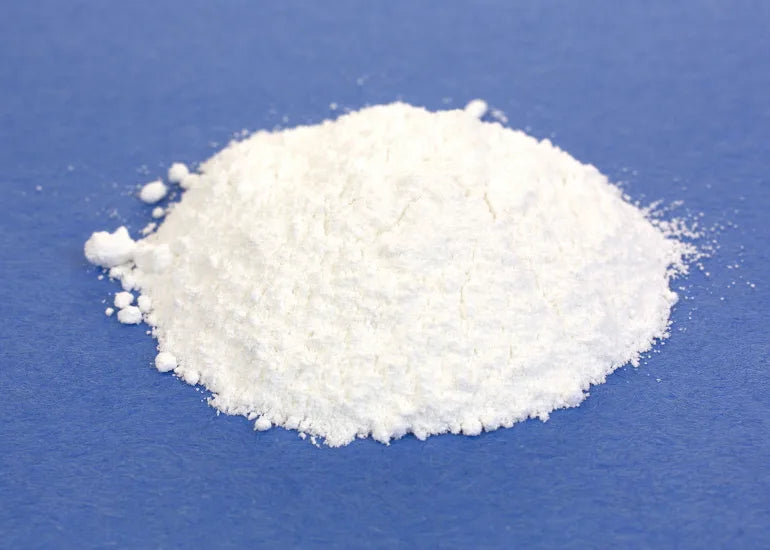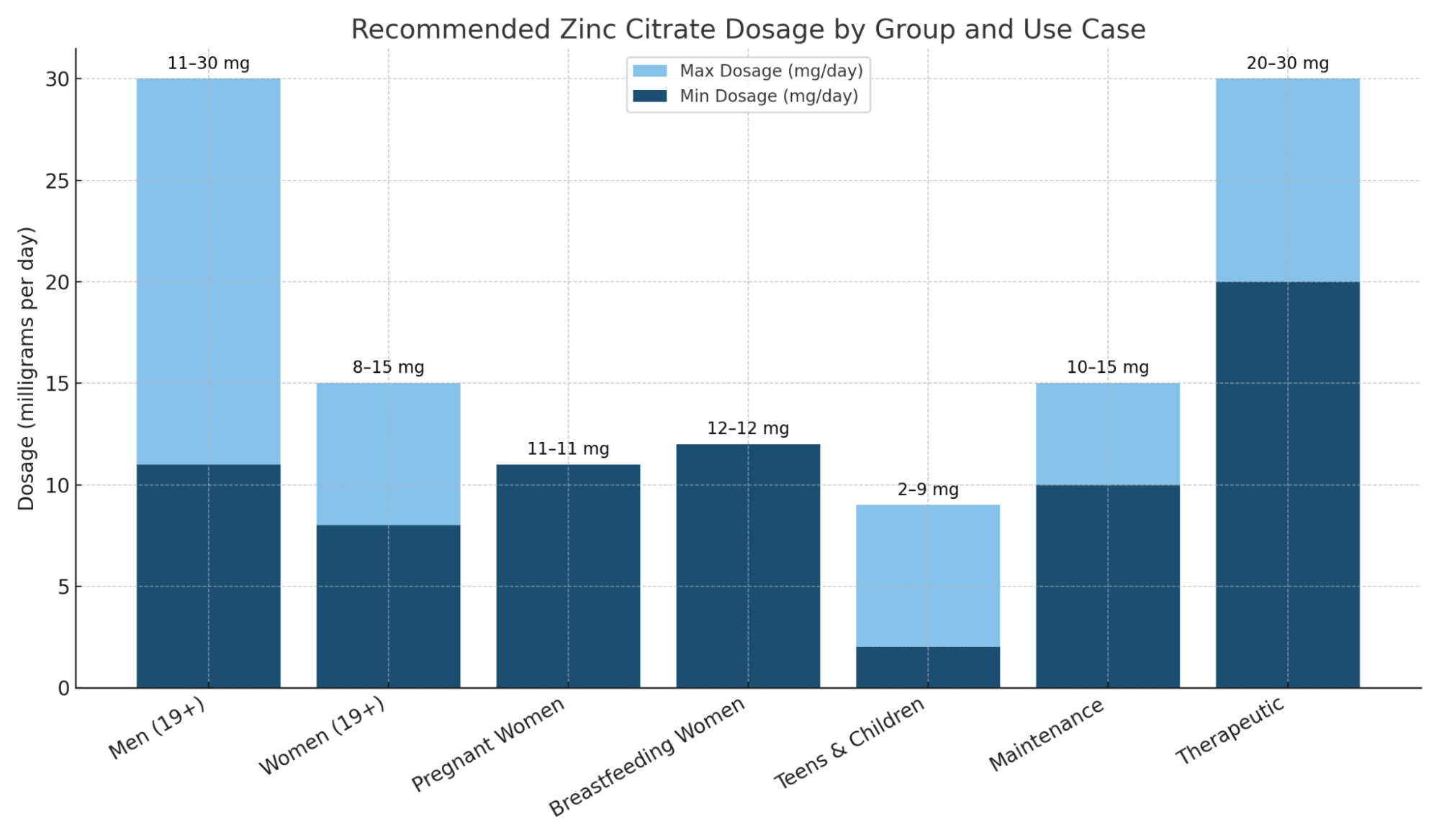
Zinc Citrate is a form of zinc bound to citric acid, making it a highly bioavailable, easy-to-absorb zinc compound commonly used in dietary supplements. Zinc is the second most abundant trace element in the body after iron, present in every cell. [1] Zinc is a mineral essential for more than 300 enzymatic functions in the human body. These enzymes, often called zinc metalloenzymes, rely on zinc either for their catalytic activity (directly participating in chemical reactions) or for structural stability, and others including: [2]
Zinc Citrate is considered one of the gentler and more absorbable forms compared to zinc oxide or sulfate, especially for individuals with sensitive stomachs.
Zinc comes in many forms like gluconate, sulfate, oxide, picolinate, acetate, and citrate each with different absorption rates and gastrointestinal tolerance.
This makes it ideal for long-term, daily use especially in people looking to support immune function, skin health, and hormonal balance.
Zinc Citrate is absorbed in the small intestine with the help of amino acid transporters. Citric acid enhances the solubility and stability of zinc, helping it pass more efficiently through the gastrointestinal lining.
Clinical studies show that zinc citrate is as well-absorbed as zinc gluconate, but better tolerated and more stable, especially when taken on an empty stomach or in fasted states.
Miduty uses Zinc Citrate, carefully sourced and standardized for:
Unlike zinc oxide or sulfate forms, Miduty's formulation is easily absorbed even in people with sensitive digestion, offering fast, consistent results without the nausea some supplements cause.
Miduty's Zinc Citrate contains:
It's clean, vegan-friendly, and produced under GMP-certified quality controls, making it a reliable daily mineral supplement you can trust.
In many Miduty formulas, Zinc Citrate is:
This thoughtful formulation ensures you're getting more than just zinc you're getting complete, results-driven support for your skin, hormones, and immune resilience.
| Uses & Benefits | Description |
| Immune System Support |
Zinc is a well-established immune booster. It plays a critical role in: [3]
|
| Skin Health and Wound Healing |
Zinc supports skin structure by:
Zinc Citrate is especially effective due to its fast absorption, helping the skin heal and regenerate from the inside out. For this reason, it’s commonly recommended for Acne and breakouts, Eczema and psoriasis, Minor cuts, burns, and skin injuries. Supplementing with Zinc Citrate can result in:
|
| Hormonal Balance and Reproductive Health |
Zinc plays a direct role in: [7]
It’s often included in fertility, libido, and testosterone-boosting supplements, as even mild deficiencies can lead to hormonal imbalances, low libido, and poor reproductive outcomes. Zinc Citrate provides consistent bioavailable zinc, making it ideal for hormone and fertility support without overstimulating the system. |
| Antioxidant and Cellular Repair |
Zinc is a natural antioxidant that: [8]
|
| Helps with Nutrient Metabolism and DNA Synthesis |
Zinc supports numerous metabolic functions, including: [9]
|

The Recommended Dietary Allowance (RDA) for zinc varies by age, gender, and life stage:
Therapeutic doses should be short-term unless supervised, as long-term high-dose zinc use may lead to copper depletion or imbalance. Most supplements offer 10-30 mg of elemental zinc per dose, which is safe and effective for daily support.
Zinc Citrate's superior absorption means lower doses are often just as effective as higher doses of less bioavailable forms like zinc oxide.
Zinc Citrate is best taken:
Taking it on an empty stomach improves absorption, but some people may experience mild nausea. If this occurs, take it with a light meal that's low in calcium (since calcium competes with zinc for absorption).
With or Without Food:
Avoid pairing zinc with high-dose iron or calcium supplements unless spaced at least 2-3 hours apart.
Zinc supplementation is effective over both short and long terms, depending on your goals:
Most users begin to see noticeable benefits such as clearer skin, fewer breakouts, better energy, or immunity support within 2-4 weeks of consistent use.
Zinc is safe when taken within recommended ranges. However, excessive intake (over 40 mg/day for extended periods) may lead to:
Balance is key, more is not always better, and Miduty's Zinc Citrate delivers a clinical dose designed for optimal effectiveness without side effects. Zinc can interfere with the absorption of Iron, Copper and Calcium.
To avoid nutrient imbalances:
Zinc also supports the activity of vitamin A and D, making it a great pairing in immune-boosting stacks.
Supplementing Tips for Best Results:
Drink plenty of water and maintain a balanced diet to support long-term zinc metabolism.
Zinc Citrate is essential for nearly everyone but especially beneficial for:
Zinc deficiency is more common than most people think, and a high-quality zinc supplement like Miduty-s can fill critical gaps in your diet and lifestyle.
How to Make It a Key Part of Your Wellness Routine?
Miduty makes it simple, effective, and safe to keep your zinc levels optimal, your skin glowing, your immunity strong, and your body balanced naturally and holistically.
Zinc citrate is commonly used to support immune health, aid wound healing, and maintain healthy skin. It also helps maintain normal growth, fertility, and the proper functioning of enzymes in the body. It's also easily absorbed by the body, making it a preferred form of zinc in supplements.
Yes, zinc citrate is good for the skin as it helps regulate oil production, supports collagen formation, and aids in wound healing. Its antioxidant and anti-inflammatory properties also make it beneficial for acne and overall skin health.
Yes, you can take zinc citrate daily, but only within the recommended dosage. Taking it in safe amounts supports immunity and overall health, while excessive intake may cause side effects like nausea or stomach upset.
Zinc citrate is generally safe when taken as directed, but high doses may cause side effects like nausea, stomach cramps, diarrhea, or headaches. Long-term excessive use can also interfere with copper absorption and weaken immunity.
The best time to take zinc citrate is on an empty stomach, either in the morning or between meals, for better absorption. However, if it causes stomach upset, it can be taken with food.
| Sr. No. | Reference |
|---|---|
| 1. | |
| 2. | |
| 3. | The Role of Zinc in the T-Cell Metabolism in Infection Requires Further Investigation - An Opinion |
| 4. | |
| 5. | |
| 6. | |
| 7. | |
| 8. | Zinc is an antioxidant and anti-inflammatory agent: its role in human health |
| 9. |
